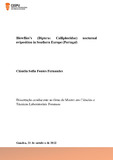Blowflies s (Diptera: Calliphoridae) nocturnal oviposition in Southern Europe (Portugal)
Resumo
The post-mortem interval (PMI) estimation is the most important application of Forensic Entomology. During the initial stages of decomposition, the minimum PMI can be estimated by identifying the necrophagous species present in the corpse and then calculating the age of the oldest immature insects. Since flies belonging to the Calliphoridae family are the first insects to colonize a dead body, they are the main indicators of the minimum PMI calculation. However, there are several factors that can make this estimation inaccurate, specifically, the possibility of nocturnal oviposition. Although it is assumed that blowflies are inactive during the night, several studies remarked that nocturnal oviposition can occur. However, the results are controversial and there is no consensus among researchers.
Since there are no previous investigations in Southern Europe, the present study aims to verify if nocturnal oviposition can occur in Portugal, through experiments held in the summers of 2021 and 2022.
Field experiments were conducted in Lisbon and Oporto, Portugal, in an urban location during the months of May to October. Control experiments were held to verify diurnal oviposition and baits were exposed during the night, two hours after sunset. Using information provided by IMPA (Instituto Português do Mar e da Atmosfera), maximum and minimum temperature, sunset/sunrise time, rainfall, wind speed, humidity levels and atmospheric pressure were registered.
Oviposition and blowfly activity was never observed during the nocturnal experiments, but occurred in 29 out of the 35 diurnal experiments - the adults that were caught and posteriorly identified during the 2022 experiments were Calliphora vicina Robineau-Desvoidy, 1830, Calliphora vomitoria (Linnaeus, 1758), Lucilia caesar (Linnaeus, 1758), e Lucilia sericata (Meigen, 1826).
Even though temperatures were adequate for Calliphoridae oviposition both during the day and night, its non-occurrence might be explained by other abiotic factors or the circadian rhythms of activity and sleep. This study suggests that nocturnal oviposition is unlikely to occur in Portugal.

